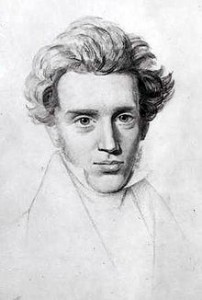Sacrificial Heterologies (Part 2)
By Asher Crispe: June 27, 2012: Category Inspirations, Thought Figures
The Binding of Kierkegaard, Heidegger, Levinas and Derrida
Logic of Kierkegaard: The Sacrifice of the Ethical
 There is a danger with paradoxes and there is a danger without them. Reality without reason/ratio, out of proportion, seems difficult to justify if in fact rationality is an agent of justice rather than a prostitute of politics. On the other hand life—without the folds that disrupt the cold continuity of reason, rifts forcing us to be better expressed by occasionally speaking against what we have spoken and our unquenchable thirst for a beyond—would feel only the stale mechanics of a system bored from keeping its own company. Wonderment, the liberation of a dis-possessed self, ventures into uncharted territory complete with untold challenges.
There is a danger with paradoxes and there is a danger without them. Reality without reason/ratio, out of proportion, seems difficult to justify if in fact rationality is an agent of justice rather than a prostitute of politics. On the other hand life—without the folds that disrupt the cold continuity of reason, rifts forcing us to be better expressed by occasionally speaking against what we have spoken and our unquenchable thirst for a beyond—would feel only the stale mechanics of a system bored from keeping its own company. Wonderment, the liberation of a dis-possessed self, ventures into uncharted territory complete with untold challenges.
None of our lead actors in Genesis 22 are thrill seekers; yet, tests engender new consciousness and forge bonds. Could it be that this controversial passage be bearing witness to the ‘binding’ of God to Abraham as much as it is of Abraham to his son? A unique bond born out of a shared traumatic experience is insoluble. Individuals cut out of the system (if that system is some tired universal Hegelian order) greet their defining experiences where they ascend beyond mediation into an inconceivable relationship. One appears directly before the Divine without the curtain drawn. For Kierkegaard:
Faith is just this paradox, that the single individual as the particular is higher than the universal, is justified before the latter, not as subordinate but superior, though in such a way, be it noted, that it is the single individual who, having been subordinate to the universal as the particular, now by means of the universal becomes that individual who, as the particular stands in an absolute relation to the absolute. This position cannot be mediated, for all mediation occurs precisely by virtual of the universal; it is and remains in all eternity a paradox, inaccessible to thought. And yet faith is this paradox. (14)
Desperate to escape the Hegelian rational system, Kierkegaard runs for this paradox. He is so quick to desire a safe haven from the dialectic that he will even sacrifice ethics (temporarily) in pursuit of his teleological suspension. God creates ethics after all. There is no natural order bearing the flag of the ethical with which G-d must compromise. How can an Almighty God not have the freedom to nullify or at least non-literally fulfill His own promises?
Promoting a kind of super-subjectivity on both the Divine and human fronts, Kierkegaard allows Abraham the possibility of carrying out the sacrifice of Isaac by reason of paradox. As paradoxos, that is “beyond belief,” faith works against its own internal intelligibility as if to say it is beyond ‘rational’ belief or ‘beyond reason’ as pure belief (if not even more exceptionally ‘beyond belief’ as reason).
Much like a Möbius strip—whose inside becomes its outside and outside its inside—the flow of reason into faith and faith into reason suggests (in the words of Žižek) that: “…in his own way, Kierkegaard was well aware of this when he posited the necessity of the religious suspension of universal ethical norms as the very fulfillment of the Ethical.” (15) The “religious suspension” is interrupted however.
As a suspended suspension, the Ethical is challenge to justify its own origins as part of the Divine economy without actually violating them. God never goes through with the ‘sacrifice’ of the ethical but rather only places it in ‘suspension’. Tension mounted, the suspense is ratcheted up and never fully released despite the abortion of the initial command. All we are left with is the ‘question’ as the sacrifice of the certainty of a previously held belief (the paradox)–the binding of the ethical to an absolute that could violate it but chooses not to. What perishes is the naïve assumptions that have been burned away by the whole experience.
With his classic acuity, Adorno distills the Kierkegaardian view of the akedah down to “The sacrifice of consciousness” which is “…the innermost model of every sacrifice that occurs in his philosophy.” (16) From this perspective, Adorno leaves room for hope amidst what might otherwise devolve into an absurd universe where: “…the ultimate Meaning of sacrifice is the sacrifice of Meaning itself” to borrow a formulation of Žižek’s. (17)
Derrida also regards Kierkegaard as shaking the foundations of consciousness during the battle to expose them to a critique. Expectations placed on the relationships between individuals and within the solitary subject are shattered. For Derrida:
The trembling of Fear and Trembling, is, or so it seems, the very experience of sacrifice. Not, first of all, in the Hebraic sense of the term, korban, which refers more to an approach or a ‘coming close to,’ and which has been wrongly translated as ‘sacrifice,’ but in the sense that sacrifice supposes the putting to death of the unique in terms of being unique, irreplaceable, and most precious. It also therefore refers to the impossibility of substitution, the unsubstitutable; and then also to the substitution of an animal for man; and finally, especially this, by means of this impossible substitution itself, it refers to what links the sacred to sacrifice and sacrifice to secrecy. (18)
In this way, we may have struck upon another sense of what’s sacrificed—namely substitution. Genesis 22 is an unrepeatable event that takes place between God and Abraham. God here is a personal God and not the God of some formalized abstract system. Nothing approaches this. For Kierkegaard, the singular bond between this moment in the life of an individual and the unmediated absolute cannot be represented as a consciousness that fully enters the order of the universal nor as speech held in common. Incommunicable, Abraham with his God remains a lonely man. No substitutes are allowed. No transfers.
In much the same way as Heidegger reserves death as the individuating moment that no one may take from me, Kierkegaard insulates the uniqueness of the individual relationship with God by evoking it as paradox. He thus sacrifices substitution—the very substitution that Levinas will come to demand in order to preserve that ethical order against any and all potential religious hostilities. Substitution is also more than accessing inside the bond. It practically manifests in the exchanging of the ‘literal lamb’ for Isaac as the figurative one. Binding a substitute would short-circuit the tension created (for Kierkegaard) climbing through the ethical beyond itself. It kills the suspense of the ‘suspension’—teleological or otherwise.
 Therefore, contends Derrida: “The ethical involves me in substitution, as does speaking. Therein the insolence of the paradox: for Abraham, Kierkegaard declares, the ethical is a temptation.” (19)
Therefore, contends Derrida: “The ethical involves me in substitution, as does speaking. Therein the insolence of the paradox: for Abraham, Kierkegaard declares, the ethical is a temptation.” (19)
In many ways, the drama set up only holds if the tension is maintained. To be a test, we cannot know in advance that the final unfolding will carry the surprise of retracting what appeared to be the original request. The ambiguity works to make the sacrifice only as real as our/Abraham’s perception of them will be. As noted by Derrida: “Abraham must assume absolute responsibility for sacrificing his son by sacrificing ethics, but in order for there to be a sacrifice, the ethical must retain all its value; love for his son must remain intact, and the order of human duty must continue to insist on its rights.” (20)
14 Fear and Trembling. Pp.84-85.
15 The Parallax Gap. P.87.
16 Kierkegaard: Construction of an Aesthetic. P. 107.
17 The Parallax Gap. P.86.
18 The Gift of Death. P.58.
19 The Gift of Death. P.61.
20 Ibid. p.66.
http://www.interinclusion.org/inspirations/sacrificial-heterologies-part-3/























;)
;)
;)
;)
;)
;)
;)
;)
;)
;)
